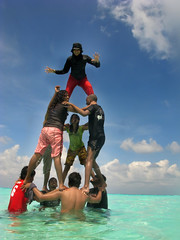It is generally accepted that trust is a pre-requisite for effective knowledge transfer and re-use, but how do you develop trust in online communities of practice, especially those of several hundred members?
 |
| trust by notsogoodphotography |
Some of the answers to developing trust can be found in this article from 1998. Although the paper was talking about virtual teams, I think many of the conclusions are valid for online communities as well, and I would suggest that these trust-building factors are applicable to communities of practice
- A focus on Social communication in the early stages of community formation - at least among the core team. After a while, social communication becomes less important, and many of the communities of practice I follow have little or no social communication nowadays.
- A transition from early communication about community process, to later communication about task. The early communications in a community are often about "how we work", but soon the conversation needs to change, and to cover content, not process.
- Communication of enthusiasm and support.
- Substantial and timely responses to members questions (so that people know that if a question is asked, they WILL get an answer - this story shows how trust is lost when people do not receive answers)
- Good leadership.
- "Phlegmatic reaction to crisis". This was suggested in the article as a key trust-builder in virtual teams which hit a rocky patch. In a community of practice, the rocky patch is often online dispute or argument, and the community leader who defuses this and turns it into creative problem solving, is often successful in building trust. Communities need a code of behaviour, and the way in which the leader deals with breaches of the code is crucial to maintaining trust in the community as "a safe place to be".
- Predictable communication. This is key in communities of practice as well as virtual teams. Communities suffer from "out of sight, out of mind" and the community that does not communicate is a community in decline. The leader needs to build and maintain momentum.




No comments:
Post a Comment